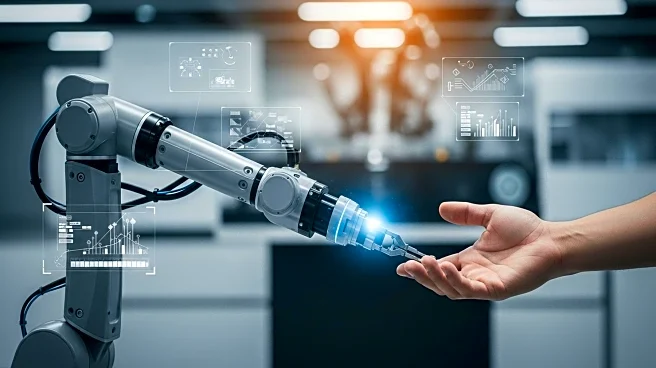What is the story about?
What's Happening?
Walmart CEO Doug McMillon has stated that artificial intelligence (AI) is set to transform every job within the company, which employs 2.1 million people globally, including 1.6 million in the U.S. McMillon emphasized that while AI is automating certain tasks, it does not necessarily mean job losses for those roles. Instead, Walmart plans to maintain its workforce at around 2 million employees, although the nature of these jobs will evolve. The company is actively tracking job functions to identify areas where workers need upskilling. Walmart has introduced new roles, such as 'agent builder,' where employees develop AI tools to assist merchants. Despite the technological shift, Walmart intends to continue employing human workers in roles requiring direct interaction with people.
Why It's Important?
The integration of AI into Walmart's operations signifies a broader trend in the retail industry and beyond, where automation is reshaping job roles and skill requirements. This development highlights the need for workforce adaptability and continuous learning, as traditional job descriptions evolve. Walmart's approach to maintaining its headcount while transforming job roles could serve as a model for other large employers facing similar challenges. The company's commitment to upskilling its workforce reflects a proactive strategy to mitigate potential job displacement and ensure employees are equipped for future demands. This shift has implications for labor markets, educational institutions, and policymakers as they navigate the changing landscape of employment.
What's Next?
Walmart plans to continue its focus on AI training and career pathways for its associates, aiming to keep its workforce stable while adapting to technological advancements. The company is participating in broader learning initiatives, such as OpenAI's certification program, to enhance AI fluency among workers. This collaboration aims to certify 10 million Americans by 2030, fostering a workforce capable of leveraging AI effectively. As roles evolve, Walmart's strategy may influence other corporations to adopt similar measures, potentially leading to widespread changes in workforce development and training programs across industries.
Beyond the Headlines
The ethical and cultural dimensions of AI integration in the workplace are significant, as companies must balance technological advancement with employee welfare. Walmart's approach to maintaining human interaction roles suggests a recognition of the value of personal touch in customer service. Additionally, the company's investment in upskilling reflects an ethical commitment to employee development, which could influence corporate culture and societal expectations regarding technology's role in employment.
















